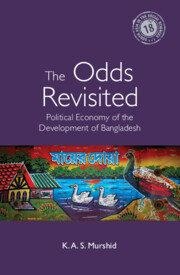Book contents
- Frontmatter
- Dedication
- Contents
- List of Tables and Figures
- Acknowledgements
- List of Abbreviations
- Introduction
- 1 A Bird’s-Eye View of the Bangladesh Economy: 1971–2020
- 2 Initial Conditions: The Odds Revisited
- 3 The Food Security Challenge
- 4 Exploring Transition and Change in the Rice Market
- 5 International Migration
- 6 The Rural Non-farm (RNF) Sector
- 7 Industrialization and the Rise of RMG
- 8 Industrialization: Other Stories
- 9 The Social Sector Puzzle
- 10 Dhaka: Capital Formation—Urbanization, Competition and the Rise of a Business Class
- Conclusion
- Notes
- Glossary
- References
- Index
2 - Initial Conditions: The Odds Revisited
Published online by Cambridge University Press: 30 June 2022
- Frontmatter
- Dedication
- Contents
- List of Tables and Figures
- Acknowledgements
- List of Abbreviations
- Introduction
- 1 A Bird’s-Eye View of the Bangladesh Economy: 1971–2020
- 2 Initial Conditions: The Odds Revisited
- 3 The Food Security Challenge
- 4 Exploring Transition and Change in the Rice Market
- 5 International Migration
- 6 The Rural Non-farm (RNF) Sector
- 7 Industrialization and the Rise of RMG
- 8 Industrialization: Other Stories
- 9 The Social Sector Puzzle
- 10 Dhaka: Capital Formation—Urbanization, Competition and the Rise of a Business Class
- Conclusion
- Notes
- Glossary
- References
- Index
Summary
Overview
The conditions at the time of its birth in 1971 could not have been less auspicious for Bangladesh. The country was overwhelmingly agricultural and rural at the time with much of agriculture dominated by just one crop, namely rice, which was grown in the vast flood plains under risky, rain-fed conditions. The other important crop was jute – the main foreign exchange earner for the country. As it happened, floods and poor successive rice harvests combined with a much-weakened administration which, along with depleted food reserves, empty coffers and an infrastructure in tatters, ushered in famine in 1974 that not only took a heavy toll in terms of human lives but also succeeded in branding Bangladesh as a poor, famine-prone and crisis-prone country that would heavily need to depend on foreign aid for a very long time – an abiding image that is only now beginning to be shed.
The infrastructure, rudimentary to begin with, was in shambles with bridges blown up, roads in poor shape and even the country's ports at Chittagong and Mongla rendered inoperative – both experiencing massive damage and destruction. The Chittagong Port suffered the greatest damage from the operations of Bengali Naval Commandos during the 1971 war who used limpet mines to blow up ships anchored in Chittagong. This disrupted shipping while at the same time sending a stark message to the enemy. It was a Russian naval contingent under Rear Admiral Sergey Pavlovich Zuenko who took up the challenge of clearing the port of all obstacles, including innumerable mines and sunken ships, to make it ready for normal operations – a process that was declared complete on 30 June 1974. It took less time to clear out the Mongla Port, which too suffered heavy damage during the war, mainly from aerial bombing.
In addition, there was the need to resettle and rehabilitate 10 million refugees who were now returning from camps in India where they had taken shelter during the hostilities, placing a huge administrative and fiscal burden on the country. There were shortages all around – for construction material, essential raw materials, clothes, food and medicine.
- Type
- Chapter
- Information
- The Odds RevisitedPolitical Economy of the Development of Bangladesh, pp. 37 - 47Publisher: Cambridge University PressPrint publication year: 2022

